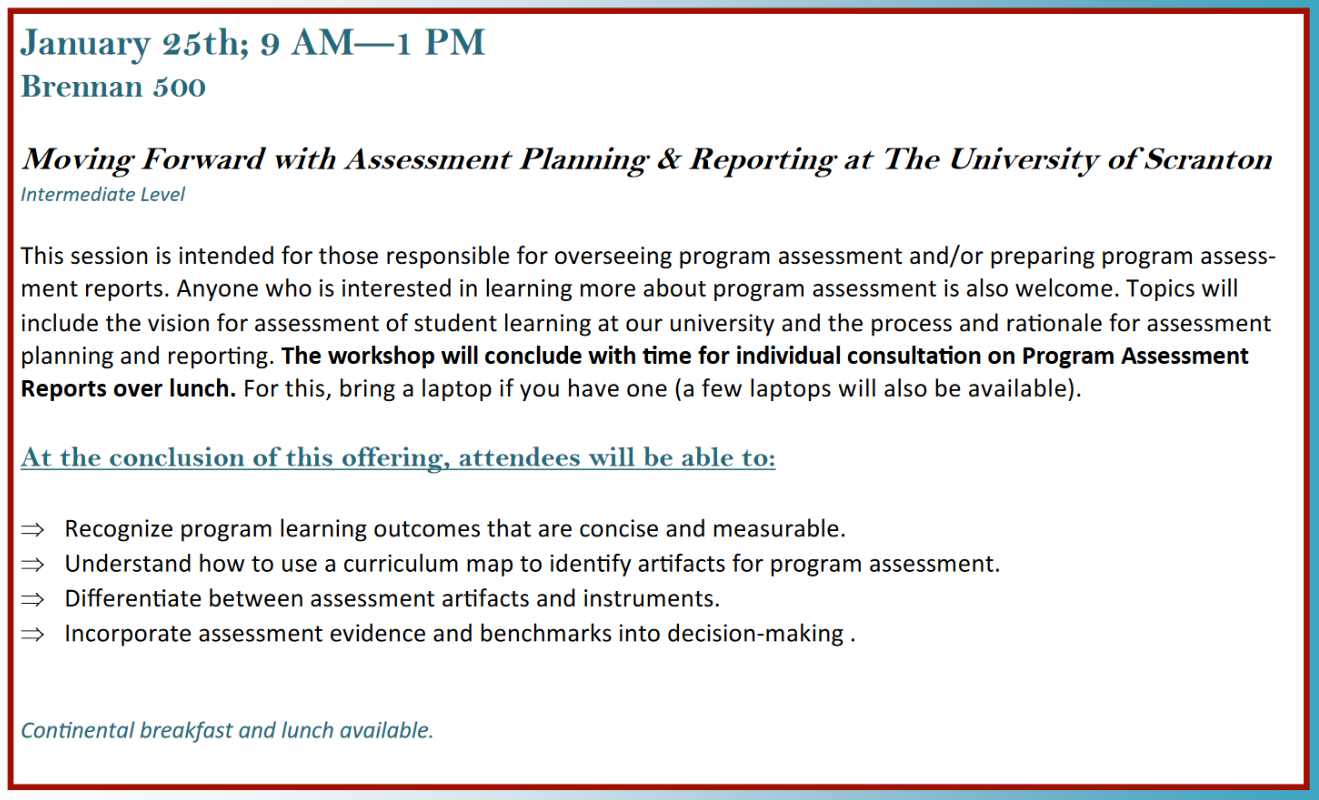Assessment Institutes
The University of Scranton's Office of Educational Assessment hosted the inagural Intersession Assessment Institute during the month of January 2014. Subsequent Assessment Institutes offered a series of workshops designed to provide guidance to faculty and others involved in student learning assessment. For more information, please email: assessment@scranton.edu
2019 Assessment Institute

2018 Assessment Institute
Portfolio and Capstone Assessment
Click here to read the workshop agenda
On Solid Ground - Value Report 2017
Written by Kathryne Drezek McConnell and Terrel L. Rhodes
Click here to read the AAC&U paper
The Learning Portfolio: Reflective Practice for Improving Student Learning
by John Zubizarreta
Click here to read this paper
2017 Assessment Insititute
Refining and Streamlining Assessment
Rubrics Presentation
Presented by Dr.Vanessa Silla, OEA Faculty Asssessment Fellow
Click here to view the workshop presentation
Benchmarks Presentation
Presented by Dr.Mary Jane K. Dimattio, OEA Director
Click here to view the workshop presentation
All-in-One: Combining Grading, Course, Program, and General Education Outcomes Assessment
NILOA Occasional Paper by Dr.Laura Ariovich and Dr. W. Allen Richman
Click here to read the NILOA occasional paper
2016 Assessment Institute
Excellent and Evaluation in Jesuit Eductaion: Ignatian Discernment & Program Practice
Creating Assessment Tools in Real Time
Presented by Richard Walsh (OEA Assessment Analyst), Cyrus Olsen (Director of GE Assessment), and Brian Snapp (CTLE)
Evidence-Based Program and Course Improvements
Presented by:
Dr. Murli Rajan (KSOM) - Click here to view the workshop presentation
Dr. Bonnie Oldham (WML)
Prof. Nicholas Truncale (CAS, OEA Assessment Fellow) - Click here to view the workshop presentation
Dr. Kevin Wilkerson (PCPS) - Click here to view the workshop presentation
Connecting Assessment Planning with Data Management Processes
Presented by Dr. Brett Everhart, Special Assistant to the Provost for Assessment & Accreditation, Lock Haven University
Click here to view the workshop presentation
Attention, Ignatian Pedagogy, and Practice - How the 5 key aspects of the Ignatian Pedagogical Paradigm can be reimagined in light of documentary filmmaking
Presented by Dr. Julia Haslett, London-born, Brooklyn-based filmmaker makes expressionistic documentaries about contemporary and historical subjects. She is particularly interested in questions of empathy, attention, and the complex dynamics of bearing witness, which are both complicated and transformed by digital technology. Her feature-length documentary, An Encounter with Simone Weil, premiered at IDFA, won Michael Moore's Special Founder's Prize at the Traverse City Film Festival, and was a New York Magazine Critic's Pick during its 2012 US theatrical run.
To read a summary report of the 2016 Assessment Institute, click this link: 2016 Summary report
2015 Assessment Institute
Assessment: Checking the Temperature | Where We Are Now & Where We Need To Be
Assessment: Checking the Temperature - Click here to view the workshop presentation
Presented by Dr. Mary Jane K. DiMattio, Director, OEA
General Education as a Program - Click here to view the workshop presentation
Presented by Dr. Linda Ledford Miller, Faculty Assessment Fellow
How Do My Student Learning Outcomes Contribute to Program Assessment? - Click here to view the workshop presentation
Presented by Dr. Mary Goldschmidt, PhD, Center for Teaching and Learning Excellence
Indirect Measures of Student Learning - Click here to view the workshop presentation
Presented by Valerie Taylor and Jordan Knicely, Office of Institutional Research
Understanding and Using Assessment Results to Improve Programs - Click here to view the workshop presentation
Presented by Dr. Jodi Levine Laufgraben, Vice Provost of Academic Affairs, Assessment & Institutional Research at Temple University
To read a summary report of the 2015 Assessment Institute, click this link: 2015 Summary report
2014 Assessment Institute
Twenty-five faculty members from the College of Arts and Sciences participated. These faculty members represented a diverse group of ten departments: Biology, Chemistry, Communication, History, Mathematics, Philosophy, Physics/Electrical Engineering, Political Science, Psychology, and World Languages and Cultures. During the intersession, these faculty members taught 18 courses, with a total of 31 sections, and 460 students.
The participants developed a variety of useful assessment measures, produced many thoughtful reflections, and in several cases used their assessment results to make changes in their courses specifically designed to improve student learning related to their stated learning outcomes.
To read a summary report of the 2014 Assessment Institute, click this link: 2014 Summary Report





